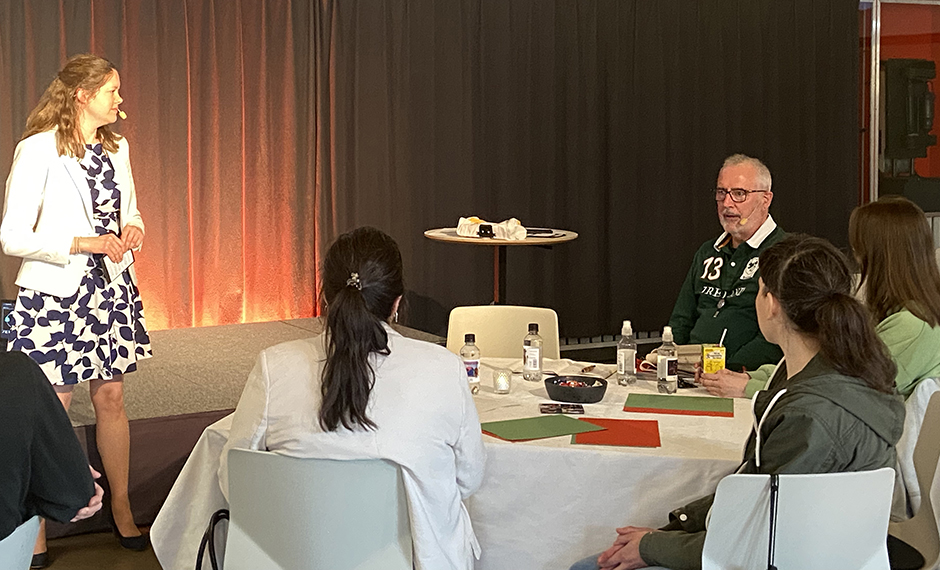On 1 June, VA’s first activity within the EU project TechEthos was held in Sweden. Members of the public met researchers to talk about new emerging climate engineering technologies held as part of an evening Climate Bar event at the National Museum of Science and Technology in Stockholm.

There is currently lots of research being undertaken into new technologies that have the potential to have a significant impact on climate change. VA (Public & Science), together with the National Museum of Science and Technology, invited interested members of the public to a science café to learn more and discuss some of the implications.
In a science café, it is the audience’s questions and points of view that drive the discussion, and many of the participants took the opportunity to catch the throwable microphone and share their opinions.
The evening’s topic was two types of climate engineering technologies – Bio Energy Carbon Capture and Storage (Bio-CCS) and Solar Radiation Management (SRM).
Three invited experts presented the technologies and some related issues:
Kevin Noone, a Professor in the Department of Environmental Science at Stockholm University, explained the SRM method, which is about sending aerosols into the atmosphere to block the rays of the sun and prevent global warming, and why the technology is controversial.
The discussion then turned to another group of technologies, CCS, whereby carbon dioxide is captured and stored in the bedrock. If the carbon dioxide comes from burning biomass (Bio-CCS), negative emissions can be achieved. Erik Dahlén, who is responsible for research and development at the energy company Stockholm Exergi, spoke about a test facility for Bio-CCS at its heating plant in Värtahamnen in Stockholm, which by 2025 will be Europe’s first large-scale facility.
Daniel Andersson, a historian of ideas and postdoc at Linköping University, then explained the role of climate-economic models when it comes to technologies for carbon dioxide capture and the importance of data modeling for decision-making. This led to further discussion between the experts, the audience and the two moderators, Linda Sandberg from the National Museum of Science and Technology and Lena Söderström from VA (Public & Science).
Among other things, participants learned that the UN panel on climate change IPCC’s climate models are based on assumptions involving the implementation of Bio-CCS on a large scale. More specifically, 2,500 large-scale facilities need to be built by the year 2040, with just 20 currently in existence. Is this realistic? In response to a yes/no question, about half of the participants thought yes, and half no.
Participants then had the opportunity to discuss certain issues with others at their table, for example, where does the responsibility for climate change lie, how can we change our own behaviour and be motivated to make changes, plus the importance of being well-informed.
The more power you have, the more responsibility you have.
It is also up to us to demand that those in power take responsibility.
Finally, everyone was encouraged to share what makes them hopeful for the future. Responses included:
- Societal development during the last two generations has happened at a furious pace. Today, we are in a position to change society in an even faster and smarter way: What will society look like in two generations’ time?
- If there is a clearly defined goal, the world can respond and achieve results quickly. We have seen this, for example, during the corona pandemic, when vaccines and treatments were developed rapidly, or in the relief efforts in Ukraine when the war started.
- Poverty around the world is decreasing, which means that more people have the opportunity to take an interest in and focus on climate-related challenges.
- The commitment is there – we see it here tonight!
- It is part of human nature not to be apathetic but to keep fighting – we will not accept climate change.
At the end of the science cafe, participants could leave their reflections and thoughts on post-it notes.
I believe in mankind! We can solve the climate issue just as we have solved other problems and challenges in the past.
I’m just one person, but I’m still one. I cannot do everything, but I can still do something and because I cannot do everything, I will not refuse to do what I can
I’m going to talk more about these issues with people I know.
The event was a collaboration between the Swedish non-profit organisation VA (Public & Science) and the National Museum of Science and Technology, and was held as part of an evening Climate Bar event at the museum on 1 June 2022.
TechEthos is an EU project highlighting the ethical challenges and social implications of new emerging technologies. During 2022, the public in six countries around Europe are being invited to participate in science cafés and workshops to discuss the ethical and social implications of three different technologies.
